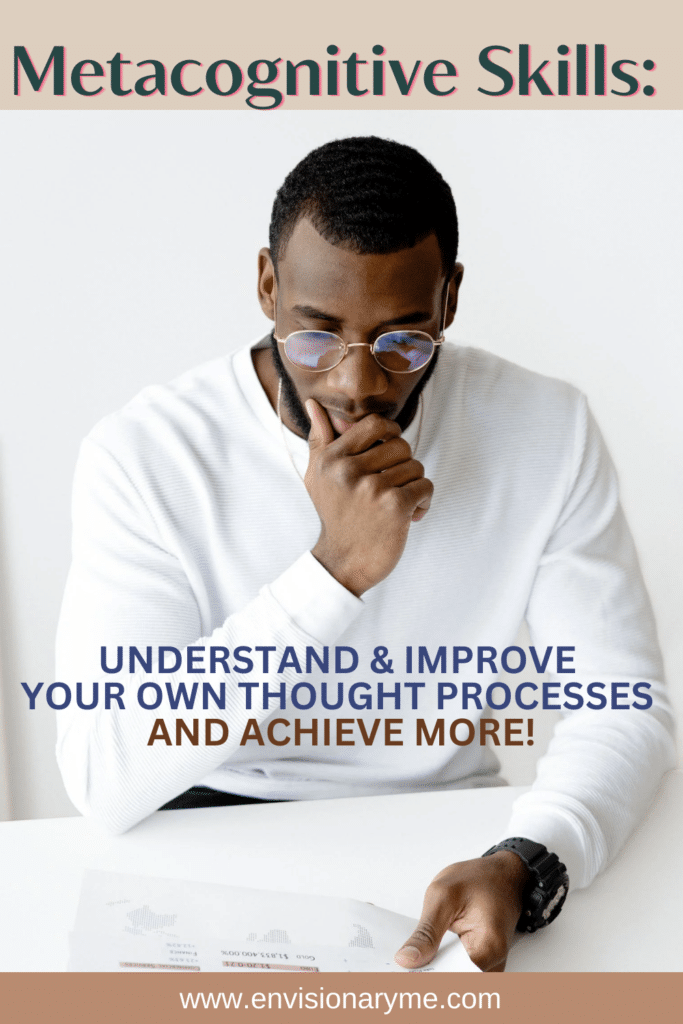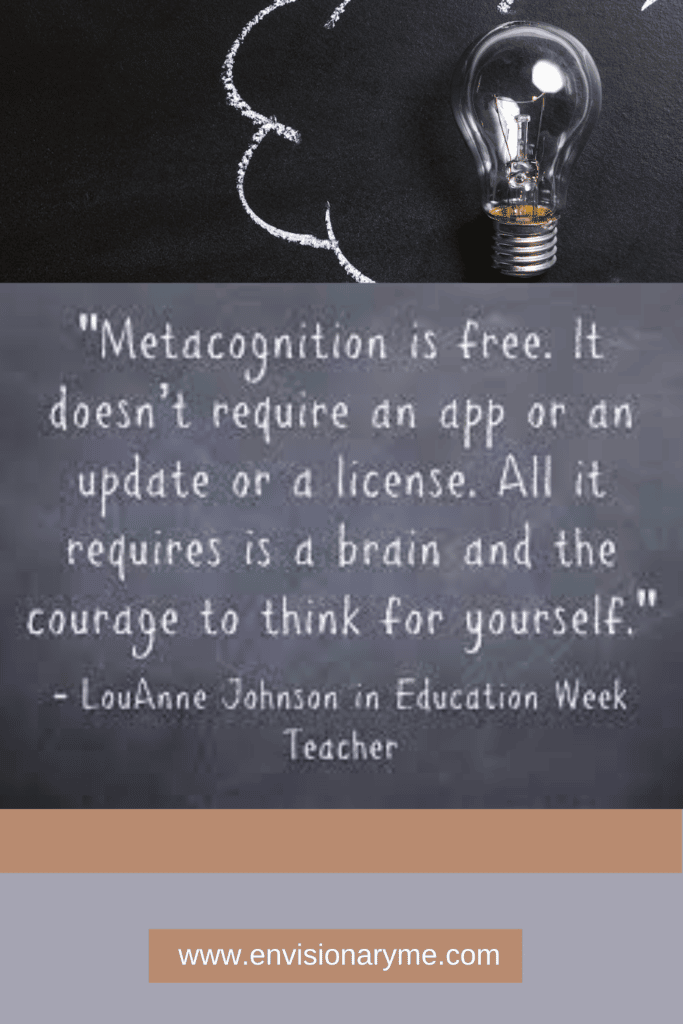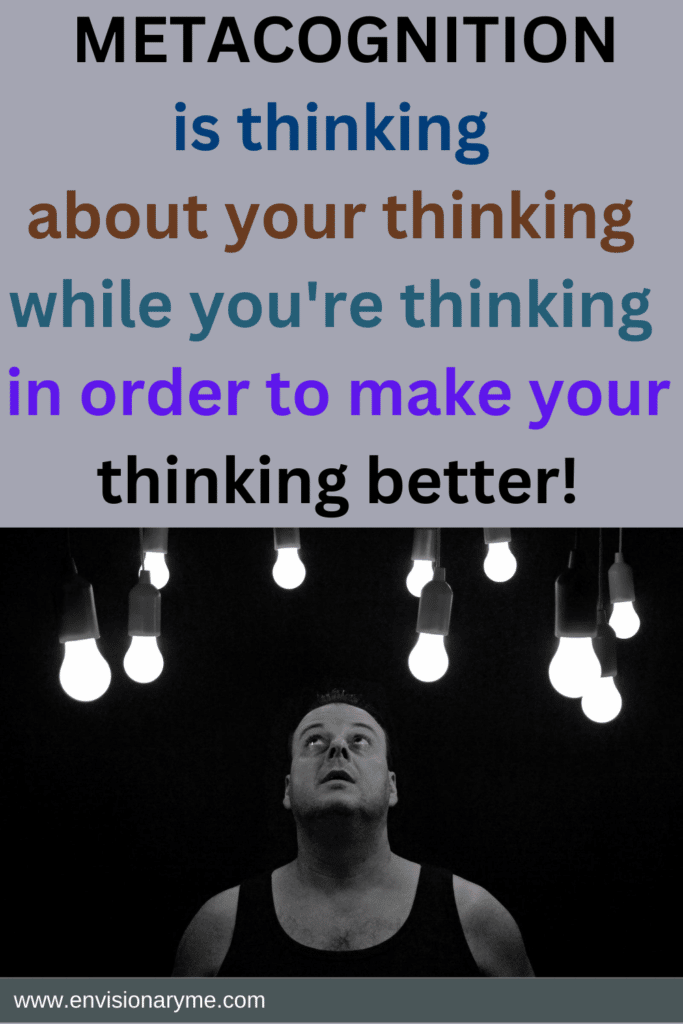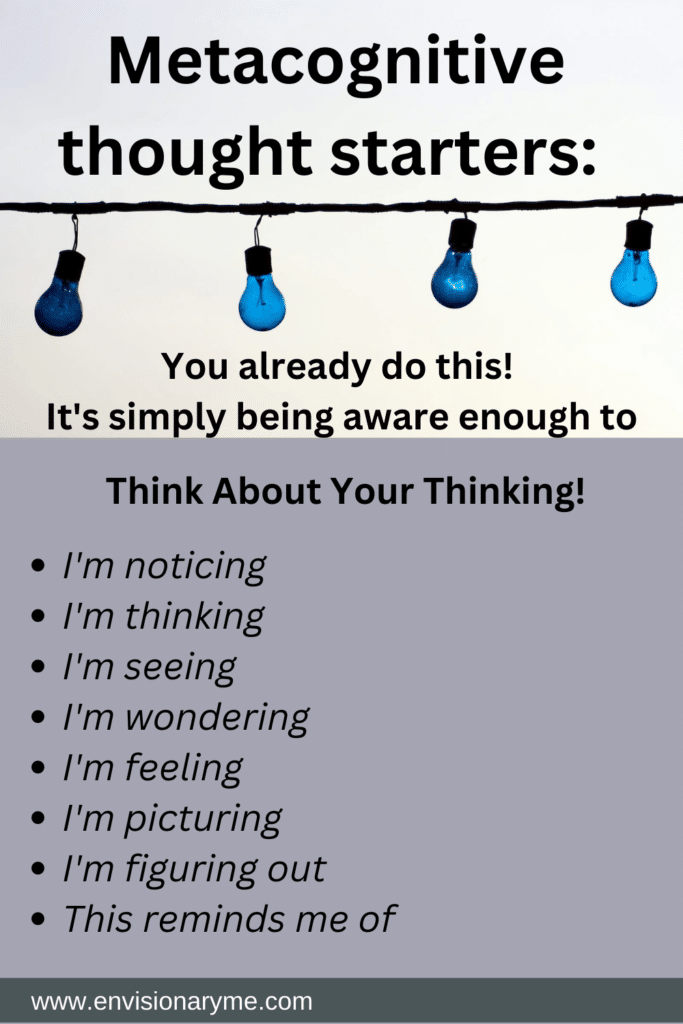Metacognition is the process of thinking about your own thinking. It involves knowing yourself enough to be aware of and reflect upon your own cognitive processes. Metacognitive skills are essential for learning and problem-solving but do not require a specific professional development plan or learning environment. Though many people do not know there is a word for this, metacognition is simply the ability for individuals to monitor their own understanding, identify areas they need to improve and take action to address those needs.

In this article, we explore metacognitive skills in depth, including what they are, why they are necessary, and how you can develop, improve, and use them. Whether you’re a student, a professional, or simply someone looking to boost your mental abilities, this guide is for you!
Everyone can develop metacognitive skills; it’s a cognitive process – a cognitive skill – but knows the process is simple!
In simplest terms: it’s thinking about thinking!
It’s a definite “do” – and why? Because understanding and improving your own mental processes lead to greater achievement! At home, school, and business, achievement leads to greater success. Whether you spell success with money, free time, or greater peace of mind, it’s all good. Improving these skills helps you to get there.
What are Metacognitive Skills?
Metacognitive skills are the mental processes that allow individuals to understand, reflect on, and control their own thinking. These skills include:
- awareness of your own thought processes
- the ability to evaluate the quality of your own thinking
- the ability to plan, monitor, and adjust your thinking as needed
Metacognitive skills are often divided into three broad categories: metacognitive knowledge, metacognitive regulation, and metacognitive monitoring.
- Metacognitive knowledge is your understanding of how your own mind works, including your understanding of different mental processes and strategies. This knowledge allows you to make informed decisions about how to approach problems and tasks.
- Metacognitive regulation involves using metacognitive knowledge to plan, monitor, and adjust your thinking as needed. This includes setting goals, monitoring your progress, and making changes to improve your understanding.
- Metacognitive monitoring is your ability to evaluate the quality of your own thinking and understanding. This includes being able to identify when you need to adjust your thinking or seek additional information and being able to reflect on your own thought processes to identify areas for improvement.

Why are Metacognitive Skills Important?
Metacognitive skills play a critical role in learning and problem-solving. They allow individuals to become more aware of their own thought processes and to make informed decisions about how to approach tasks and problems.
For example, a student with strong metacognitive skills can reflect on their understanding of a subject and identify areas where they need to improve. These skills allow them to have a deeper understanding of their own strengths and weaknesses; then they use this knowledge to address those needs, by seeking additional information or asking a teacher for feedback.
Similarly, a professional with strong metacognitive abilities can reflect on their own thought processes and identify areas for improvement. They can then take action to address those needs, such as requesting additional training or obtaining feedback from colleagues.
In both cases, the metacognitive process allows the person to become more successful as a result of being an effective learner and problem-solver. The benefits include:
- comprehending more which leads to applying specific strategies
- having a greater ability to focus and even activate prior knowledge
- retaining information increases a person’s ability to understand and continuously improve

Develop and Improve Your Metacognitive Skillset
Developing and improving your metacognitive skills requires a combination of knowledge and practice. Here are 4 steps to get you started:
1. Be aware of your own thought processes: Start paying attention to your thoughts as you approach tasks and problems. Consider what strategies you are using to solve problems and learn new information. Self reflect. Consider. Ponder. Just for a moment. Maybe there is a better way.
2. Seek feedback: Ask others for feedback to help you better understand of yourself and ideas you share. For example, ask teachers, mentors, or colleagues for their perspectives on your strengths and areas for improvement.
3. Experiment with different strategies: Try out different problem-solving and learning strategies to see what works best for you. Experiment with different approaches and consider what feels best – what feels right – and what you learn from each experience.
4. Set SMART goals for yourself: Focus your efforts and see if you become more effective by setting SMART goals for yourself. SMART goals are: Specific. Measurable. Achievable. Realistic. Timebound. At first, maybe set a goal about eating 3 healthy meals a day, or getting in a form of exercise, or improving your study or work habits. Try something easy, but meaningful!
Incorporating metacognitive strategies can easily become part of your lifelong learning process!
Make decisions based upon your own situation and needs. We all need ways to improve, and we need learning activities to help improve our competence, but we tend to follow through more when we go about it in ways that are interesting and convenient. Our lives are busy enough, so knowing we can make adjustments as we go along, allows us to benefit without increasing pressure on ourselves.
Think about it as completing a task, feeling good about it, and then moving on to the next task!
Developing your self-awareness will help you maximize your learning style, while allowing you to also maximize your time.
Metacognitive skills include:
- Awareness of your own thought processes: being aware of what you’re thinking and how you’re thinking about it
- Setting goals and planning: setting goals to help you learn or problem-solve and tying in an active plan to achieve those goals
- Monitoring your own thought processes and adjusting them as needed: you are monitoring and adjusting to improve your understanding of something or to help solve a problem
- Reflecting upon your thoughts: taking time to consider your own thought processes, experiences, and understanding, then using what you realized to improve your problem-solving skills. Use this as a form of self evaluation.
- Metacognitive regulation: this is simply controlling and adjusting your thought processes, by focusing your attention, regulating your emotions, or using effective strategies to solve problems
- Strategic thinking: using a variety of strategies to solve problems and learn new information, then choosing the most effective strategy for a situation.
How college students can improve metacognitive skills:
- Keep a learning journal: Reflect on your learning by keeping a journal and writing about: 1) what you learned, 2) what you still need to learn, 3) how you plan to continue learning.
- Practice self-assessment: Identify areas where you need to improve. Set a simple goal to ask your professors and other students more questions and ask for honest feedback.
- Use graphic organizers: Use an organizer tool or app to organize and categorize information and help you improve your overall understanding of the relationships between concepts.
- Encourage active reading: Actively engage with the material you read by underlining, taking notes, and asking questions. Reflect on your understanding of the material and identify areas where you need to improve.
- Encourage metacognitive reflection: Reflect on your own thought processes and learning experiences and to use those insights to identify areas for improvement.
- Use effective study strategies: Maybe, summarize information, use flashcards, or create study guides. Experiment with different strategies to find what works best for you. You used some of these strategies during grade school, and many have lifelong applications!
- Practice metacognitive skills: Take part in group discussions, problem-solving activities, and writing assignments that require reflection. Sometimes you will want to quietly listen and take notes; other times, you will talk more or ask questions. It’s part of the skillset!
As a college student, incorporating these strategies into your learning helps you develop and improve your metacognitive skills. Where does this lead? To more effective learning and a better academic outcome!
A tip for mentors!
Applying metacognitive strategies helps ensure your mentorship program is successful!
Helping your mentee develop metacognitive skills supports their learning and problem-solving skills. Chances are, your mentorship program goals can benefit from the use of these skills! You can easily help learners develop, and by helping learners think, you help them learn! Sounds pretty basic, I get it, but you are increasing their buy-in and improving your mutual partnership; later, you will evaluate their learning together. Even if you are both a novice in this area, your program goals will more likely be met.
Helping students develop is your goal, right?! Develop their metacognitive skillset now, and they will forever keep it in their repertoire of strategies!
The initial planning phase is where you’ll come together on what appropriate skills and strategies are needed as part of goal setting. It doesn’t end there, though. As the program unfolds, you’ll still need to monitor the program and question whether the goals set and activities selected are appropriate.
Awareness of one’s thinking process and personal goals is a need for you, too, as instructors also need to set their own personal goals! Your task is to help develop, monitor and evaluate the process with your mentee. But you have weak areas too! All humans do, no matter how skilled and successful we are. Include planning and model your thought process in a similar fashion, and your own thinking skills will also improve.
We accept that sound reading strategies are a necessity, but self-regulation has grown increasingly important. Just know – helping yourself or helping students or others develop metacognitive skills has great future use and leads to successful learning at school, work, and home.
Help yourself or help them develop metacognitive skills! No matter how a person needs to focus or is tasked to help – it is a win-win! The perfect time is Now. You got this!


0 Comments